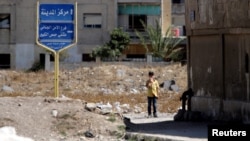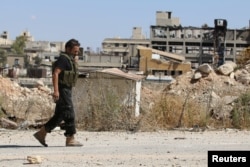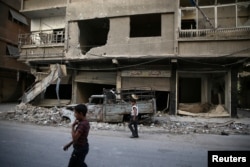A top United Nations relief official says a joint U.N. and Syrian Red Crescent convoy was bombed Monday west of the Syrian city of Aleppo, with many humanitarian workers killed or wounded.
Special U.N. advisor Jan Egeland, speaking in New York late in the day, said the convoy carried emergency relief to nearly 80,000 people, but he could not provide immediate details on casualties. Opposition-linked Syrian activists said at least 12 aid workers and truck drivers were killed in the attack, which came just hours after the Syrian army declared an end to a weeklong cease-fire.
It remains unclear whose aircraft struck the convoy. But a Pentagon statement late Monday quickly disavowed U.S.-led coalition involvement.
The truce was called to allow food and medicines to reach hundreds of thousands of Syrian civilians cut off from outside aid by government troops. However, monitors and humanitarian aid workers say no aid was disbursed in the first six days of the truce, while blaming the government of President Bashar al-Assad for refusing to honor its agreement to facilitate the deliveries.
Earlier Monday, U.S. officials said envoys from the 19-nation International Syria Support Group will hold an emergency session Tuesday at U.N. headquarters to assess conditions on the ground in that war-ravaged country.
The cease-fire did not require Syria and its Russian ally or U.S. backed rebels to halt attacks on Islamic State extremists seeking to overrun the country.
Earlier Monday, the Syrian military command accused rebel groups seeking to topple the Assad government of undermining the truce by using the lull to rearm and fortify their positions.
However, monitors, rebels and United Nations humanitarian personnel seeking to deliver the aid countered those accusations, saying government troops had themselves obstructed relief efforts while repeatedly violating the cease-fire.
By midday, U.S. State Department spokesman John Kirby said Washington was prepared to extend and strengthen the truce, and will rely on Russia's influence with the Assad government to meet those objectives.
U.S., U.N.: No Relief Reaches Aleppo During Truce
Hours before the first reports of the bombed relief convoy, U.S. Secretary of State John Kerry said humanitarian aid deliveries were expected to reach civilians in the besieged city of Aleppo and seven other locations in Syria.
Kerry earlier accused the Assad government of blocking the aid and said Russia must do more to put pressure on the embattled Syrian leader to cooperate.
Kerry also called on Sunday for Assad to support a U.S.-Russian military plan to coordinate military actions. In doing so, he reiterated U.S. regrets for an errant bombing run that is said to have killed dozens of Syrian soldiers in eastern Syria on Saturday.
For his part, U.N. emergency relief coordinator Stephen O'Brien, in a statement earlier Monday, said he was "pained and disappointed" that relief convoys have not reached Aleppo, where as many as 275,000 people are in need of food, water and medical aid.
"The people of Syria have suffered long enough," O'Brien said. "Millions of Syrian civilians continue to face horrific deprivation and violence, especially those trapped in besieged and hard-to-reach areas," he added.
Assad, Russia Question U.S. Commitment to Truce
Assad is quoted in Syrian state media as saying U.S.-led coalition airstrikes that hit Syrian army positions near Deir Ezzor Saturday were a "flagrant aggression." He also said the incident showed an "increase in support for terrorists by countries opposing Syria."
Russia's defense ministry said rebel violations made it "pointless" for government troops to uphold the truce.
French Foreign Minister Jean-Marc Ayrault - set to attend the ISSG meeting Tuesday - said the U.S.-Russian cease-fire deal “remains the only hope to resolve the conflict."






